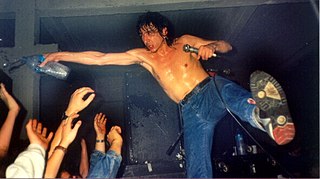 W
WBasque music refers to the music made in the Basque Country, reflecting traits related to its society/tradition, and devised by people from that territory. While traditionally more closely associated to rural based and Basque language music, the growing diversification of its production during the last decades has tipped the scale in favour of a broad definition.
 W
WBertsolaritza [berˈts̺olaɾits̻a] or bertsolarism is the art of singing extemporaneously composed songs in Basque according to various melodies and rhyming patterns. Bertsos can be composed at a variety of occasions but are performed generally by one or various bertsolaris onstage in an event arranged for the purpose or as a sideshow, in homage ceremonies, in benefit lunches and suppers, with friends or at a competition. Such a sung piece of composition is called a bertso, the person who sings it is called a bertsolari and the art of composing bertsos is called bertsolaritza in Basque. Traditionally these were sung by men but there is an increasing number of young female bertsolaris today.
 W
WBasque Radical Rock, was a musical genre born in the Southern Basque Country at the beginning of the 1980s and, although there was no specific event, it is considered to have ended in the last years of the decade. Basque Radical Rock bands were particularly influenced by punk bands like Sex Pistols and The Clash. It was considered an underground movement, born in opposition to the values proclaimed by Francisco Franco and spread by thousands of people who felt with the Spanish transition to democracy their Basque national and social aspirations were betrayed.
 W
WBilbao Orkestra Sinfonikoa (BOS) is a symphony orchestra based in Bilbao, Basque Country.
 W
WGatibu is a Basque rock band from Gernika-Lumo, Biscay, northern Spain. Its name "Gatibu" means 'captive' in Basque. The group was formed around Alex Sardui, former lead vocalist of Exkixu, in summer 2002.
 W
W"Gernikako Arbola" is the title of a song in bertso form presented both in Madrid (1853) and by the shrine of Saint Anthony at Urkiola (1854) by the Basque bard José María Iparraguirre, celebrating the Tree of Gernika and the Basque liberties. The song is an unofficial anthem of the Basques, besides the "Eusko Abendaren Ereserkia", a largely instrumental version used for official purposes in the Basque Autonomous Community. In 2007, as set out by the 4/2007 Chartered Decision, the General Assembly of Biscay declared it the district's official anthem.
 W
WHerrena is one of the parts performed by the traditional txalaparta players, the other one being the ttakuna; another lesser known traditional term for herrena is urguna. The herrena is opposed to the ttakuna in that it breaks the balance the latter intends to maintain. Their rhythmic choices consist of two beats, a single beat or a rest, as opposed to the ttakuna, who may always strike twice.
 W
WLendakaris Muertos are a punk rock band formed in Pamplona, Spain in 2004. The band is known for their orthodox punk, with fast and short tunes, usually dealing in an ironic way about the social problems in the Basque Country and Spain. The band's name is inspired by the American band Dead Kennedys.
 W
WThe maskarada [mas̺ˈkaɾada] is an itinerant set of traditional dances, theatre acts and parades that takes place annually in different towns and villages across the Basque region of Soule, France, during the time of carnival. It is generally referred to in the plural (maskaradak) as it is repeated across the region on the streets of villages over the span of a month or two in late winter through spring. The plays are performed by the villages' inhabitants, and the arrangements for each maskarada are the responsibility of each participating village. Sometimes, when two villages are very small, they will share arrangements together.
 W
WThe pastoral is a traditional kind of play from the Basque Country held in the region of Soule, France. It features a set range of characters and acts repeated on all pieces. This kind of theatre represents a dualism between the wicked and the righteous. On every new creation, a different story is staged, where verses are recited in Zuberoan Basque by the players following a pre-established stance and steps on the scene. Singing and dance play an important role too, the performance actually culminating with a choral staging where the collective spirit is voiced. The development of the story is supported by a brass-band and/or the xirula and the psalterium (ttun-ttun).